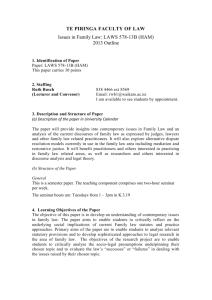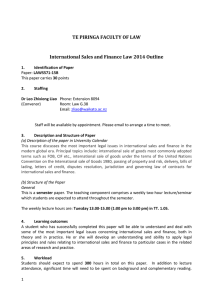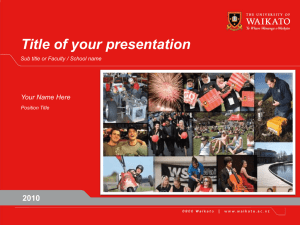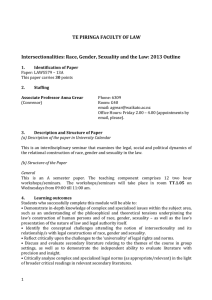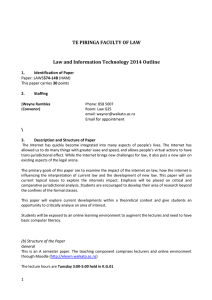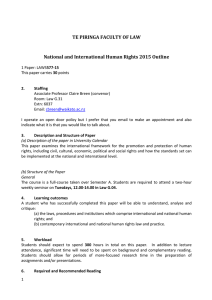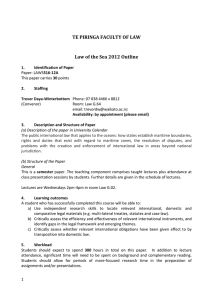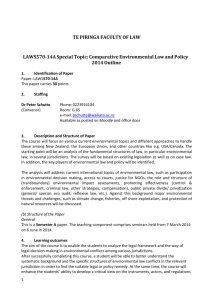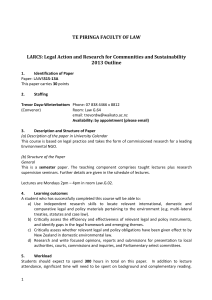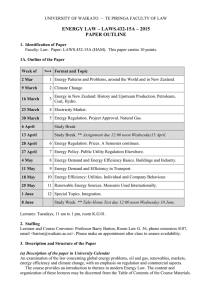LAWS566-15A Legal Theory
advertisement
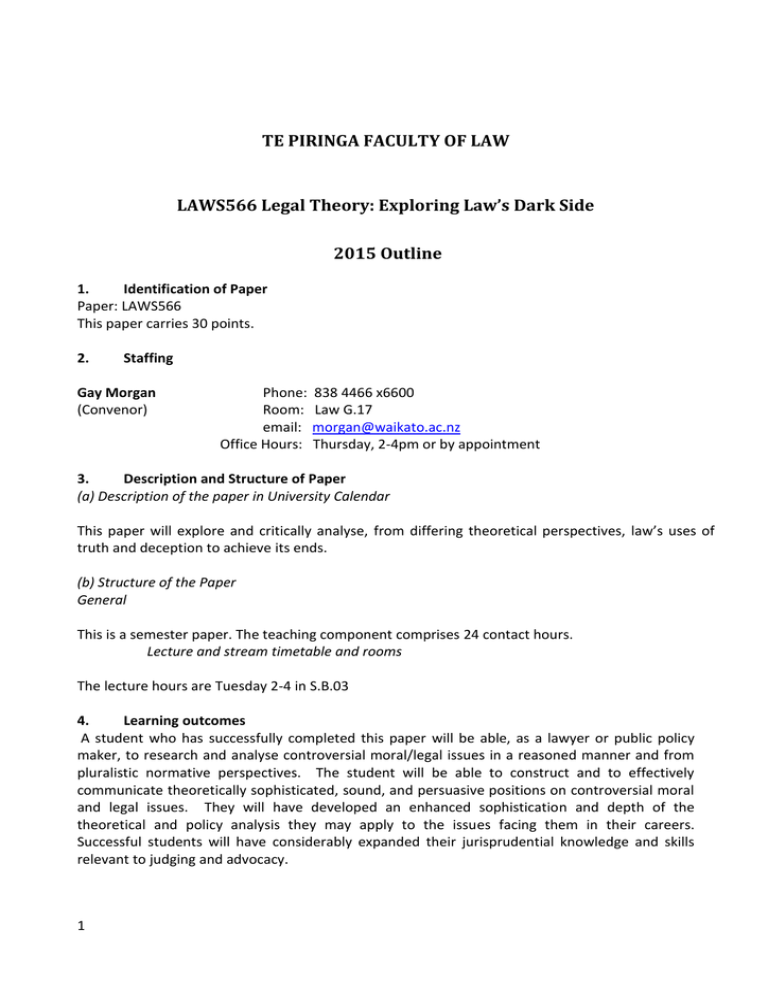
TE PIRINGA FACULTY OF LAW LAWS566 Legal Theory: Exploring Law’s Dark Side 2015 Outline 1. Identification of Paper Paper: LAWS566 This paper carries 30 points. 2. Staffing Gay Morgan (Convenor) Phone: Room: email: Office Hours: 838 4466 x6600 Law G.17 morgan@waikato.ac.nz Thursday, 2-4pm or by appointment 3. Description and Structure of Paper (a) Description of the paper in University Calendar This paper will explore and critically analyse, from differing theoretical perspectives, law’s uses of truth and deception to achieve its ends. (b) Structure of the Paper General This is a semester paper. The teaching component comprises 24 contact hours. Lecture and stream timetable and rooms The lecture hours are Tuesday 2-4 in S.B.03 4. Learning outcomes A student who has successfully completed this paper will be able, as a lawyer or public policy maker, to research and analyse controversial moral/legal issues in a reasoned manner and from pluralistic normative perspectives. The student will be able to construct and to effectively communicate theoretically sophisticated, sound, and persuasive positions on controversial moral and legal issues. They will have developed an enhanced sophistication and depth of the theoretical and policy analysis they may apply to the issues facing them in their careers. Successful students will have considerably expanded their jurisprudential knowledge and skills relevant to judging and advocacy. 1 5. Workload Students should expect to spend 300 hours in total on this paper. In addition to lecture attendance, significant time will need to be spent on background and complementary reading. Students should allow for periods of more-focused research time in the preparation of assignments and/or presentations. 6. Required and Recommended Reading All law students are required to purchase, for use in all law papers, a copy of McLay, Murray & Orpin, New Zealand Law Style Guide, Thomson Reuters (2009). This is available from Bennetts, at an approximate price of $24.29. R Fuller Legal Fictions (1967) S Bok Secrets: On the Ethics of Concealment and Revelation (1989) S Bok Lying: Moral Choice in Public and Private Life (1989) KL Scheppele, Legal Secrets: Equality and Efficiency in the Common Law (1988) J Hesk Deception and Democracy in Classical Athens (2000) D Nyberg The Varnished Truth: Truth telling and Deceiving in Ordinary Life (1993) J Campbell The Liar’s Tale: A History of Falsehood (2001) S Blackburn, Truth: A Guide (2005). M Lakoff, G & Johnson, Metaphors We Live By (1980). D Baldino (ed.) Democratic Oversight of Intelligence Services (2010) (some chapters) Other nonbook readings will be handed out (or added!) as per the lecture schedule, as the paper progresses. Further material may be provided on the paper site on Moodle (http://elearn.waikato.ac.nz), the University of Waikato’s online learning system. Any such material is provided on the following terms: University of Waikato owns the intellectual property rights, including copyright, in and to this site, or has acquired the necessary licenses to display the material on the site. As a student of the Te Piringa Faculty of Law, you are granted a limited license to use (access, display or print a single copy) the material from the papers in which you are enrolled for the purposes of participating in the paper only, provided the information is not modified. Materials may not under any circumstances be copied, stored, distributed or provided in any form or method whatsoever to any third party. Any other use of the material is prohibited. None of the material may be otherwise reproduced, reformatted, republished or re-disseminated in any manner or form without the prior written consent of University of Waikato. To obtain such consent, please contact the Te Piringa Faculty of Law. 7. Online support Online support for this paper is provided via Moodle. 8. a) 2 Assessment Requirements for assessed work School procedures for the presentation of course work are set out in the Te Piringa Faculty of Law Graduate and Postgraduate Handbook which is available from: www.waikato.ac.nz/law/graduate. See also paragraph 12 below on referencing guidelines and plagiarism. An assignment template document including coversheet is available on the Law Student Homepage www.waikato.ac.nz/law/student/. b) Coursework: Final Examination Ratio: 100/0 c) Assessment Components Component Course Work: Percentage of overall mark 100% Essay: Proposal Presentation Discussion papers Prepared seminar participation b) Due date 75% 5% 5% 10% 5% 29 June 04 May 26 May/2 June 2 per quarter Ongoing Assessment Components Essay: An essay, of between 10,000-12,000 words in length, on a topic to be agreed upon between student and lecturer, critically analysing some aspect of deception by, in, and through legal forums must be submitted on Moodle by 29 June, 4pm. The essay mark counts for 75% of the final grade. The essay will demonstrate the student’s understanding of theoretical concepts and an ability to apply them appropriately to critically analyse a concrete problem or issue in law and to develop constructive suggestions for possible solutions. Proposal and presentation: A proposal worth 5% of the mark is due in by Monday, 4 May at 4:30 pm. The proposal will require the student to formalize and organize their thinking and research around their topic. Presentations of the proposed paper are scheduled for 26 May and 2 June, in class. The presentation will enable the student to discuss their project with the class, to identify areas needing clarification or coverage, and to receive constructive comment from other members of the class. Students will develop their skills in cogent and effective oral presentation of their work and considered response to oral questions/comments. The proposal and presentation marks count for 10% of the final grade 3 Prepared Participation: Thoughtful and prepared seminar participation will constitute 5% of the final result. Students may be asked to lead the seminar discussions around particular readings, but will be forewarned at least a week before the relevant class. Discussion Papers: Students are required to write 1-2 page comments on some of the readings for two class sessions per quarter. Comments may include general reactions to the readings, critiques, etc., and should include at least one question raised for the student by the readings. Students will circulate these comments through a class Moodle posting at least 24 hrs in advance of class. The four discussion papers will account for 10% of the final grade. Students are VERY WELCOME to post more than four discussion papers of their reactions and thoughts on the readings, but must post at least two per quarter. Should more than the minimum be posted, students may indicate which of their discussion papers, per quarter, they wish to be considered for marking. d) Handing in, marking time and collection All assignments must be submitted electronically through Moodle (http://elearn.waikato.ac.nz), and include a coversheet. The coversheet template is provided on the Law Student Homepage (www.waikato.ac.nz/law/student). See Te Piringa Faculty of Law Graduate and Postgraduate Handbook, available at www.waikato.ac.nz/law/graduate. Where practical, it is the policy of Te Piringa Faculty of Law to return marked work to students within five weeks of submission. If you require assistance with Moodle, or encounter any problems, please contact the Help Desk. You can send a message to Help Desk by using the instant message service in your paper’s Moodle site (from the participants list within the People block). Alternatively, you can email them directly at help@waikato.ac.nz or call 838 4008. e) Measurement of Achievement Achievement in assignments and presentations will be measured in terms of levels of understanding and knowledge gained, in terms of the originality and the sophistication of analysis provided, in terms of coherent and logical structure, and in terms of the fluency and accuracy of expression and referencing. f) Management of assessment deadlines, process for requesting extensions and special consideration, and for appeals i) Extensions Students are required to complete and submit all internal assessment by specified dates. The meeting of deadlines is a mark of professionalism and its enforcement is essential for fairness to all students taking the paper. Handing in course work on or before the due in date also facilitates the timely return of marked work by academic staff. Students should meet requirements as to time deadlines for course work, or make a request for an extension or special consideration in appropriate circumstances (see Graduate Programmes Manual available from the Faculty of Law Graduate website www.waikato.ac.nz/law/graduate/.) Failure to comply with requirements as to the time deadlines for internal assessment without having successfully applied either for an extension or special consideration with supporting evidence before the due date will result in deduction of 2.5 marks for each day the work is late. Lateness of more than a week may result in 4 the work not being marked. No deadlines may be extended beyond two weeks after the last teaching day of the semester(s) in which the paper is taught as final grades must go to the Board of Examiners at this time. Unless an extension in writing has been granted, a lecturer may refuse to accept a piece of work which is submitted after the specified date, and automatically award it no mark, or may lower the mark as a penalty for lateness. Applications for extension, on the form obtainable from the Resource Room, must be submitted to the Chief Examiner or nominee. Students should not submit the extension form to the lecturer, nor should students seek extensions from the lecturer via other forms of communication. Extensions will be granted only on evidence of illness, family bereavement, or serious personal accidents or circumstances. Please note that too many assignments due at the same time is NOT an acceptable reason, neither are claims that computers and/or printers have crashed. Account will be taken of the time in which the student has had to complete the internal assessment before the supervening event occurred. It will be important to consider if the grant of the extension will give the student in question an unfair advantage over other students. A maximum period of 21 days will be given as an extension unless there are exceptional circumstances. In determining applications the Chief Examiner or nominee may consult with the Convenor or lecturer of the relevant paper. When the Chief Examiner or nominee has made a decision on the application for extension, the Resource Room Administrative Assistant will advise the student of the decision by email. Following this, the extension form will be given to the relevant lecturer who will retain it until after the assignment is marked and returned to students. The form will then be placed on the student’s file. It should be noted that if an extension of longer than 14 days is granted, the assignment will not be automatically printed out and delivered to the lecturer, therefore the lecturer is responsible for ensuring the assignment is printed. In appropriate cases, when a student’s application for extension is declined the Chief Examiner or nominee will inform the student of the process for applying for special consideration. ii) Special Consideration The Assessment Regulations 2005 as set out in the University Calendar 2015 list in detail the university-wide policies and procedures, which apply concerning missed examinations, impaired performance or impaired preparation time for an examination, and missed or impaired course work. Students are responsible for ensuring that they comply with these regulations. Application forms for special consideration for internal assessment are available from the Resource Room. iii) Appeals (University Calendar 2015, Assessment Regulations 2005, Reg. 24) A student may appeal against any decision taken under these regulations. An appeal, comprising a written statement of the circumstances of the appeal, together with supporting evidence if available, must be submitted by the student in writing to the Director of Student & Academic Services not more than seven days after the date on which notification of the relevant decision is received. Appeals under this section are considered and decided by the Deputy Vice-Chancellor by delegated authority of the Academic Programmes Committee. A decision by the Deputy Vice-Chancellor is notified in writing, and is final. 9. 5 University Calendar Regulations and Policies Your attention is drawn to the following regulations and policies, which are published in the University Calendar 2015. Assessment Regulations 2005 Student Discipline Regulations 2008 Computer Systems Regulations 2005 Policy on the Use of Māori for Assessment Student Research Regulations 2008 Ethical Conduct in Human Research and Related Activities Regulations 2008. 10. Links to other papers The theories underpinning law and legal systems are linked to all legal, philosophical and social science endeavours, as well as many in the arts, humanities and physical sciences.. 11. Fees Refer to http://calendar.waikato.ac.nz/admission/tableoffeesandcharges.html. 12. (a) (b) Referencing guidelines and caution against plagiarism Referencing must be in accordance with the New Zealand Law Style Guide. All written work submitted for the purposes of assessment must be your own work. Copying or paraphrasing all or part of another person’s work, be it published or unpublished, without clear attribution, is plagiarism. Plagiarism is misconduct and is dealt with under the disciplinary procedures of the University as outlined in the Student Discipline Regulations 2008 in the University Calendar. “Plagiarism means presenting as one’s own work the work of another, and includes the copying or paraphrasing of another person’s work in an assessment item without acknowledging it as the other person’s work through full and accurate referencing; it applies to assessment presented through a written, spoken, electronic, broadcasting, visual, performance or other medium.” See section 3, Assessment Regulations (2015 Calendar) Unless approved otherwise by the examiners of the papers concerned, a student must not submit as assessment material that is substantially the same as material submitted as assessment for a different paper. (c) The Te Piringa Faculty of Law’s policy regarding plagiarism is contained in the Te Piringa Faculty of Law Graduate and Post-Graduate Handbook and the Te Piringa Faculty of Law Graduate Programmes Manual, available from www.waikato.ac.nz/law/graduate/. 13. Health and safety The Faculty of Law’s Health and Safety representative is Ms Renee Rewi who is in Room Law G69 at ext 6727. 14. Class representation At the commencement of the semester, a class representative will be elected by the students in Legal Theory. This representative is encouraged to communicate regularly with the Convenor. Students in this paper are encouraged to liaise with their representative to discuss issues of 6 concern. Contact details for the Student Representation Coordinator, Academic Services Division, are as follows ext. 6264, email: student.reps@waikato.ac.nz 15. Complaints procedures The brochure Student Concerns and Complaints Policy provides details of the University’s process for handling concerns and complaints and is available from Faculty and School Offices, The Gateway and Student Services Division and is contained in the Calendar 2015. See also the document Student Support Structure at Te Piringa Faculty of Law, available from the Resource Room. 7 Lecture Schedule A Semester Week Commencing Programme of lecture topics These may change as seminar progresses: 2 March (Semester A Starts) Introduction and overview. Discussion: Meir Dan-Cohen “Decision Rules and Conduct Rules: On Acoustic Separation in Criminal Law” (1984) 97 Havard Law Review 625-677. (on Moodle) Larry Alexander and Emily Sherwin “Deception in Morality and Law” (2003) 22 Law and Philosophy 393 (on Moodle) 9 March Michael S. Moore “The Semantics of Judging” (1981) 54 Southern Cal. Law Review 151-294. Lon Fuller Legal Fictions (1967) Chpt 1 Lon Fuller Legal Fictions (1967) Chpt 2 16 March Lon Fuller Legal Fictions (1967) Chpt 3. J.M. Balkin “Deconstructive Practice & Legal Theory” 96 Yale Law Journal 743 S. Brewer (1987) “Figuring the Law Holism and Tropological Inference in Legal Interpretation” ( 1988) 97 Yale Law Journal 823 J Campbell The Liar’s Tale: A History of Falsehood (2001) (selected chptrs) Blackburn, S Truth: A Guide (2005) (selected chptrs). 23 March Sissela Bok Lying: Moral Choice in Public and Private Life (1989) 30 March (3 April Good Friday) Bok 1, continued Sissela Bok Secrets: On the Ethics of Concealment and Revelation (1989) 6 April (Easter Monday & Tuesday) Teaching Recess 13 April Teaching Recess 20 April (25 April Anzac Day) Bok 2, continued. 8 David Nyberg The Varnished Truth: Truth Telling and Deceiving in Ordinary Life (1993) 27 April (27 April ANZAC Day - observed) Nyberg continued 4 May Kim Lane Scheppele Legal Secrets: Equality and Efficiency in the Common Law 1988 11 May Jon Hesk Deception and Democracy in Classical Athens (2000) 18 May D Baldino (ed.) Democratic Oversight of Intelligence Services (2010) (some chapters) 25 May 1 June (1 June Queen’s Birthday) 8 June Study Week 15 June Examinations 22 June Examinations 29 June Teaching Recess 6 July Teaching Recess/Enrolment 9
